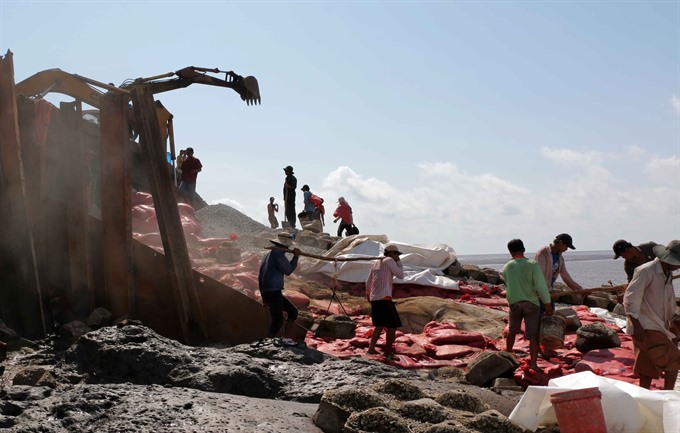|
MARD
inspects Mekong landslide aftermath
MEKONG DELTA – The Ministry of
Agricultre and Natural Resources is seeking solutions to prevent landslides
in the Mekong Delta, after a landslide occurred on the Vàm Cỏ Lau Canal on
Monday afternoon in An Giang Province, causing six houses to collapse and
forcing two other households to relocate.

Workers fixing Gành Hào sea dyke in Đông Hải District in the Cửu Long
(Mekong) Delta province of Bạc Liêu after it collapsed due to high tides and
strong waves. Seawater flowed into residential areas. - VNA/VNS Photo Nguyễn
Thanh Liêm
Late
last month, a serious landslide along the Vàm Nao River occurred in Chợ
Mới District of the province,
causing losses of VNĐ90 billion ($3.96 million).
The
most recent landslide, which occurred in the province’s An Phú District’s Phú
Hữu Commune, left a crater that was 100m long, 10m wide and 15m deep.
As
soon as the crack on the canal was discovered on May 4, commune authorities
urged local people to evacuate, thus avoiding loss of life.
Local
police and the Army were asked to help residents relocate their properties to
safe areas, and to put up warning signs and ban vehicles at the site of the
landslide.
Of
the eight households still living in the high-risk area, five houses could
collapse at any moment.
Cao
Xuân Diệu, chairman of the commune’s People’s Committee, said that each
family whose house collapsed suffered a loss of VNĐ30 million (US$1,320).
The
commune gave each affected household VNĐ1 million in cash and 10 kilos of
rice per person.
Inspections
On
May 9, a group of officials from the Ministry of Agriculture and Rural
Development (MARD) began a four-day trip to review the causes of the
landslides in the Delta and work with local authorities to set up plans to
deal with disasters that have threatened people’s lives.
On
the first day, the group visited several sea dykes in Bạc Liêu Province.
Though
the province has great potential to develop the sea economy thanks to its
56-km coastline, it has been affected by climate change, rising sea levels,
saltwater intrusion and sea dyke breaching, threatening 100,000 people living
by the sea, Dương Thành Trung, chairman of the Bạc Liêu Province People’s
Committee, said at a meeting with MARD officials.
Since
the beginning of the year, high tides, huge waves and strong winds have
damaged the Gành Hào dyke in Đông Hải District’s Gành Hào Town and Nhà Mát
dyke in Bạc Liêu City’s Nhà Mát Ward.
Erosion
has occurred on a 940 sq.m area of the Gành Hào Sea Dyke, while erosion on
the Nhà Mát embankment stretches for 24 metres. Cracks and subsidence along
the rest of the embankment have been reported.
The
two sea dykes play an important role in protecting thousands of households
and tens of thousands of hectares of coastal land.
Bạc Liêu
Province has
asked for assistance from experts at research institutes and universities to
solve the problem of dyke breaching.
One
of the adopted measures would help reduce the height and strength of waves.
The
province has asked for VNĐ340 billion ($14.95 million) of aid to implement
measures to prevent further erosion and protect sea dykes.
Trần
Quang Hoài, deputy head of MARD’s
Water Resource Directorate, praised the province’s efforts to deal with
erosion and instructed it to protect the dykes as the rainy season would come
soon.
After
the trip, MARD will work with other ministries and agencies to find a
long-term and sustainable plan to combat landslides in the delta.
The
delta has around 265 highly vulnerable spots where landslides have occurred,
covering a total 450km in length.
Landslides
have caused an annual average loss of 500ha of land in recent years.
The
situation has worsened in recent years, especially in An Giang Province’s Chợ
Mới District and Đồng Tháp Province’s Thanh Bình District.
Đồng
Tháp Province on April 28 declared a state of emergency after several
landslides occurred in April along a 210m section of the Tiền River in Thanh
Bình District’s Bình Thạnh Commune. -VNS
|
Thứ Năm, 11 tháng 5, 2017
Đăng ký:
Đăng Nhận xét (Atom)
Không có nhận xét nào:
Đăng nhận xét